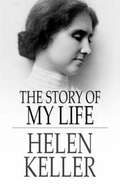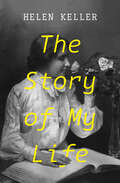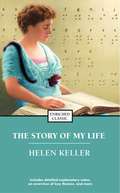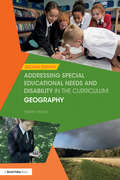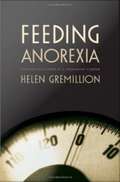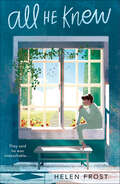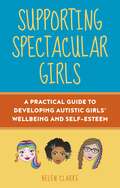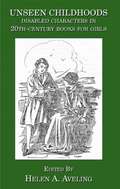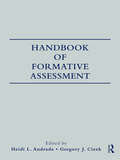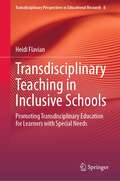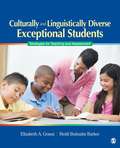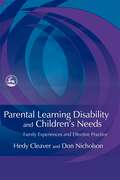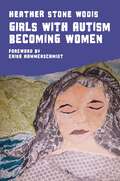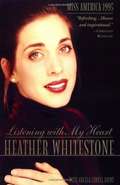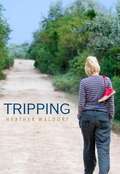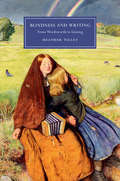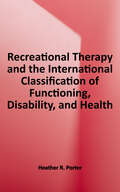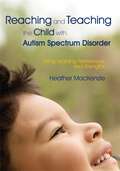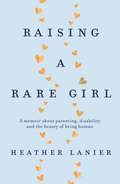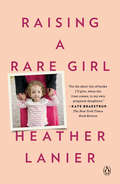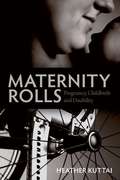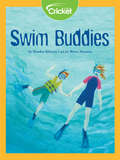- Table View
- List View
The Song of the Stone Wall
by Helen KellerAn unrhymed poem, fashioned from traditional style, first published in 1910 in which a rough, enduring old stone wall, that winds over hill and meadow, becomes a symbol of New England history. Its importance lies in the meaning it held for Helen Keller, and the strength she gained from its existence.
The Story of My Life: With Her Letters (1887-1901) And A Supplementary Account Of Her Education, Including Passages From The Reports And Letters Of Her Teacher, Anne Mansfield Sullivan, By John Albert Macy
by Helen KellerA classic of American autobiography—the remarkable story of Helen Keller&’s early life and education At nineteen months old, Helen Keller was stricken with a mysterious illness that left her deaf and blind. For the next five years, she was trapped in the silent dark, her only means of communication a few dozen rudimentary signs. Her inability to express herself was a great source of frustration, and as she grew older, Helen became prone to angry outbursts and fits of despair. Her family sought help, and in March of 1887, twenty-year-old Anne Sullivan arrived from the Perkins Institution for the Blind. One month later, teacher and student made the first of many incredible breakthroughs. By placing one of Helen&’s hands under cool running water and tracing the letters w-a-t-e-r on her other hand, Anne was able to convey the great mystery of language: that every object has a name. As Helen would later write in The Story of My Life, &“That living word awakened my soul.&” Covering the first twenty-two years of Helen Keller&’s life, from that miraculous moment at the water pump to her acceptance into Radcliffe College, The Story of My Life is one of the most beloved and inspiring autobiographies ever written. The basis for The Miracle Worker, the Tony Award–winning play and Academy Award–winning film, its heartening message has touched millions of lives and torn down countless barriers the world over. This ebook has been professionally proofread to ensure accuracy and readability on all devices.
The Story of My Life: With Her Letters And A Supplementary Account Of Her Education (Enriched Classics)
by Helen KellerEnriched Classics offer readers accessible editions of great works of literature enhanced by helpful notes and commentary. Each book includes educational tools alongside the text, enabling students and readers alike to gain a deeper and more developed understanding of the writer and their work.Left blind, deaf, and mute after an illness in infancy, Helen Keller overcame her disabilities with the help of Anne Sullivan, her inspired teacher. Her classic autobiography, first published in 1903, covers her first twenty-two years, including the memorable moment at a water pump when she first made the connection between the word "water" and the cold liquid flowing over her hand. She also discusses her friendships with Oliver Wendell Holmes and other notables, her education at Radcliffe, her joy at learning to speak, and above all, her extraordinary relationship with her teacher. This deeply moving memoir, full of love and compassion for others, offers an unforgettable portrait of one of the twentieth century's most remarkable women. Enriched Classics enhance your engagement by introducing and explaining the historical and cultural significance of the work, the author's personal history, and what impact this book had on subsequent scholarship. Each book includes discussion questions that help clarify and reinforce major themes and reading recommendations for further research. Read with confidence.
Addressing Special Educational Needs and Disability in the Curriculum: Geography (Addressing SEND in the Curriculum)
by Helen HarrisThe SEND Code of Practice (2015) reinforced the requirement that all teachers must meet the needs of all learners. This topical book provides practical, tried and tested strategies and resources that will support teachers in making geography lessons accessible and interesting for all pupils, including those with special needs. The author draws on a wealth of experience to share her understanding of individual needs and show how the geography teacher can reduce or remove any barriers to learning. Offering strategies that are specific to the context of geography teaching, this book will enable teachers to: ensure all pupils are able to participate in every lesson; provide inclusive fieldwork opportunities that take into consideration the needs of all pupils; use formative assessments to measure learning and inform planning; plan the classroom layout and display to enhance learning; successfully use the support of their teaching assistants. An invaluable tool for continuing professional development, this text will be essential for middle school and secondary geography teachers (and their teaching assistants) who are committed to creating an inclusive learning environment for all pupils, regardless of their individual needs. The book will also be of interest to SENCOs and inclusion managers, curriculum co-ordinators, senior management teams and ITT providers. Full of practical ideas and inspiration, and supported by free online resources, this is an essential tool for geography teachers and teaching assistants who want to deliver successful, inclusive lessons for all pupils.
Feeding Aorexia: Gender and Power at a Treatment Center
by Helen GremillionFeeding Anorexia challenges prevailing assumptions regarding the notorious difficulty of curing anorexia nervosa. Through a vivid chronicle of treatments at a state-of-the-art hospital program, Helen Gremillion reveals how the therapies participate unwittingly in culturally dominant ideals of gender, individualism, physical fitness, and family life that have contributed to the dramatic increase in the incidence of anorexia in the United States since the 1970s. She describes how strategies including the meticulous measurement of patients' progress in terms of body weight and calories consumed ultimately feed the problem, not only reinforcing ideas about the regulation of women's bodies, but also fostering in many girls and women greater expertise in the formidable constellation of skills anorexia requires. At the same time, Gremillion shows how contradictions and struggles in treatment can help open up spaces for change. Feeding Anorexia is based on fourteen months of ethnographic research in a small inpatient unit located in a major teaching and research hospital in the western United States. Gremillion attended group, family, and individual therapy sessions and medical staff meetings; ate meals with patients; and took part in outings and recreational activities. She also conducted over one hundred interviews-with patients, parents, staff, and clinicians. Among the issues she explores are the relationship between calorie-counting and the management of consumer desire; why the "typical" anorexic patient is middle-class and white; the extent to which power differentials among clinicians, staff, and patients model "anorexic families"; and the potential of narrative therapy to constructively reframe some of the problematic assumptions underlying more mainstream treatments.
All He Knew
by Helen FrostA 2021 Scott O'Dell Award WinnerA Society of Midland Authors Winner in Children's FictionA Bank Street Best Book of the Year 2021A novel in verse about a young deaf boy during World War II, the sister who loves him, and the conscientious objector who helps him. Inspired by true events.Henry has been deaf from an early age—he is intelligent and aware of langauge, but by age six, he has decided it's not safe to speak to strangers. When the time comes for him to start school, he is labeled "unteachable." Because his family has very little money, his parents and older sister, Molly, feel powerless to help him. Henry is sent to Riverview, a bleak institution where he is misunderstood, underestimated, and harshly treated.Victor, a conscientious objector to World War II, is part of a Civilian Public Service program offered as an alternative to the draft. In 1942, he arrives at Riverview to serve as an attendant and quickly sees that Henry is far from unteachable—he is brave, clever, and sometimes mischievous. In Victor's care, Henry begins to see how things can change for the better. Heartbreaking and ultimately hopeful, Helen Frost's All He Knew is inspired by true events and provides sharp insight into a little-known element of history.
Supporting Spectacular Girls: A Practical Guide to Developing Autistic Girls' Wellbeing and Self-Esteem
by Helen ClarkeAutistic girls can be frequently misunderstood, underestimated and therefore anxious in a school environment. This practical book offers an innovative life skills curriculum for autistic girls aged 11 to 15, based on the author's successful workshops and training, which show how to support girls' wellbeing and boost their self-esteem.Including an adapted PSHE curriculum, this is a straightforward guide to educating autistic children on the issues that matter most to them. It covers all essential areas of wellbeing, including communication, identity, self-regulation and triggers, safety, and physical and mental health, and offers the reader strategies to help the autistic girls in their lives enhance and develop these.
Unseen Childhoods: Disabled Characters in 20th-Century Books for Girls
by Helen A. AvelingThe nine essays in this collection break the 20th century into three periods - early, middle, and late. They cover the themes of stereotypes, role models, and inclusion and segregation, tracing their evolution across nearly a hundred years. Among the essays are "Modeling Illness in the Early 20th Century" by Helen A. Aveling; "A Choice of Virtues," by Deborah Kent; and "My Sibling the Other," by Rebecca R. Butler.
Handbook of Formative Assessment
by Heidi L. Andrade Gregory J. CizekFormative assessment has recently become a focus of renewed research as state and federal policy-makers realize that summative assessments have reached a point of diminishing returns as a tool for increasing student achievement. Consequently, supporters of large-scale testing programs are now beginning to consider the potential of formative assessments to improve student achievement. The mission of this handbook is to comprehensively profile this burgeoning field of study. Written by leading international scholars and practitioners, each chapter includes a discussion of key issues that dominate formative assessment policy and practice today, as well as those that are likely to affect research and practice in the coming years. Key features include: Comprehensive – nineteen chapters cover all aspects of formative assessment including classroom assessment, large-scale applications, technological applications, applications for special needs students, K-12 and post-secondary applications, psychometric considerations, case studies, and discussion of alternative assessment formats such as portfolios and performance assessments. Integrative – thoughtful attention is given to the integration of large-scale and classroom assessments. Practical – provides practical guidance on how to conduct formative assessments that generate credible information to guide instruction. Global – provides perspectives from leading international scholars and practitioners whose expertise spans diverse settings, student populations, and educational systems. Accessible Style – although grounded in the latest research, the book’s style and tone has been carefully crafted to make it accessible to both the textbook and professional markets. It will also be a critical reference book for researchers in teacher preparation, educational administration, and educational policy studies.
Reducing Barriers to Training of Blind Graduate Students in Psychology
by Heidi JoshiTo increase the number of psychologists with visual impairments, all levels of the pipeline, from graduate training through practica and internship, need to be accessible to this population. This study sought to determine the types of barriers students who are blind face in their psychology graduate programs. The areas explored in the study included accessing printed materials throughout participants' graduate process, administering and scoring test protocols, accessing sources for research, and obtaining campus-wide communications. Attitudinal barriers were also explored in this study, particularly from supervisors, instructors, and peers. There is very little research in this area and as a result, this study was designed to elucidate the experiences of participants with visual impairments in their graduate programs. One goal was to give training institutions a better understanding of the barriers faced by students who are blind. Nineteen participants were interviewed using a semi-structured questionnaire consisting of yes/no and open-ended questions. Descriptive statistics were utilized in order to obtain the major themes of the responses. The most universal barrier related to the plethora of printed material encountered in graduate training. Nearly all of the participants discussed difficulties in obtaining printed material in alternate formats. They especially found it difficult to get enough sources in a timely manner for their research. Participants discussed missing class changes or other important details due to this information being posted in print and not accessible to them. Attitudes were a second barrier frequently encountered. Participants stated that they had to contend with the prejudicial attitudes of supervisors, professors, and peers who were meant to assist them in their process. Participants also discussed their wish to have more disability related awareness and education activities implemented in the curriculum of their graduate institutions. This would assist these institutions in overcoming the attitudinal barriers experienced by their students who were blind. However, participants also discussed supportive factors such as partners and professors who would provide appropriate classroom accommodations. Despite the over thirty years since passage of the rehabilitation act, and the fourteen years since the implementation of the American with Disabilities Act. Results indicate that numerous barriers still exist for graduate psychology students who are blind. These barriers must be aggressively addressed for persons who are blind to be afforded equal access to training in psychology.
Transdisciplinary Teaching in Inclusive Schools: Promoting Transdisciplinary Education for Learners with Special Needs (Transdisciplinary Perspectives in Educational Research #8)
by Heidi FlavianThis book offers opportunities for better understanding teachers’ unique challenges when planning teaching sessions for learners with special needs, based on the transdisciplinary approach. The work also presents some of the core learning strategies teachers may incorporate into their teaching processes in order to promote transdisciplinary learning among learners with special needs.From a theoretical perspective, this book discusses a variety of advantages and disadvantages transdisciplinary educators may encounter, and promotes educators' development of their own vision of this area. Although the concept of special needs is often over-generalized, this book relates to the most common types of special needs among learners who study in inclusive schools: learners from different cultural background, learners with Attention Deficit Hyperactive Disability (ADHD), learners with Autism Spectrum Disorder (ASD), and learners with sensory or motor challenges. A special chapter is dedicatedto each of those groups in order to closely examine how teachers can teach those learners according to the transdisciplinary approach in practice, in inclusive classrooms. While each chapter presents different perspectives of learners with special needs, the book’s summary integrates them all and highlights the commonalities between the various needs.
Culturally and Linguistically Diverse Exceptional Students: Strategies for Teaching and Assessment
by Elizabeth A. Grassi Heidi Bulmahn BarkerConnects theory to practice while presenting foundational teaching and assessment practices for CLDE students. Practical in nature and designed with an eye toward universal design for learning, this text brings together foundational information from special education and ELL/bilingual fields to help teachers address the specific needs of culturally and linguistically diverse exceptional (CLDE) students. Key Features: Case studies from teachers, students, and parents describe the personal challenges of CLDE students. Authentic student language examples illustrate the concepts described and make practical connections to the research discussed Activities for further understanding allow students to review key points and connects theory to classroom practice. Ancillaries available at www. sagepub. com/grassi Password-protected instructor resources include PowerPoint lecture slides, sample syllabi, and Web resources. An open-access student study site provides online video clips of teachers in action, which exemplify different strategies and are accompanied by critical thinking questions from the authors. Students can also access additional case studies and relevant SAGE journal articles from the study site.
Parental Learning Disability and Children's Needs: Family Experiences and Effective Practice
by Hedy Cleaver Don NicholsonParental Learning Disability and Children's Needs explores how to effectively assess children in families where one or more parent has a learning disability. These children often have unmet needs because their parents are more likely to be coping with mental and physical illness, domestic violence or substance abuse. The book examines current social care practice in this area, whether it is working, and the impact it has on families. The authors describe how, although some parents with a learning disability face a significant risk of losing their children, most continue to look after them and, while support provided by social services and other agencies, can be significant it is rarely sustained and the health and welfare of many children suffers as a result. Case studies and interviews from original research support the authors' recommendations for policy and practice to combat these problems. This book will prove to be an invaluable source of information for all social workers and other professionals working with someone who is both a parent and has a learning disability.
My Eyes Have A Cold Nose
by Hector ChevignyThe author says that when he became blind, he thought it would be a great nuissance, and indeed it was. He maintains that the greatest problem for blind people is society's fixed notions that blind people are utterly helpless and utterly tragic, and he describes how he and other blind people have dealt with this problem. One of the key parts of his rehabilitation was his training at The Seeing Eye. This book is old, but still relevant in many ways.
Girls with Autism Becoming Women
by Heather Wodis Erika HammerschmidtThis insightful book investigates the experiences of seven women with autism as they transition from childhood to adulthood, and how they make sense of that journey. Taken from the autobiographies of women including Liane Holliday-Willey and Temple Grandin, these accounts shine a light on issues unique to women with autism. Heather Stone Wodis provides a detailed and thoughtful exploration of their common experiences, and each story offers a new perspective that illuminates the diagnosis from a different angle. This is a fascinating look at how generational differences, such as access to the internet, can provide more avenues toward self-expression, political mobilization, and advocacy. It also explores the idea that, no matter the era, the unyielding support of family and a diagnosis in childhood can help girls with autism transition toward adulthood.
Listening with My Heart
by Angela Elwell Hunt Heather Whitestone<P>Heather Whitestone. Her name has become synonymous with incredible determination and unprecedented achievement. In Listening with My Heart, Heather tells her own story and the stories of others who have inspired her, proving that with hard work, perseverance, and faith, each of us can move mountains. <P>Profoundly deaf since she was eighteen months old, Heather strove to live a normal life, and refused to listen to the voices of discouragement that many of us so often hear, no matter what problems confront us. She wouldn't listen to the doctor who said she wouldn't develop beyond third-grade abilities, or to those who said she would never dance ballet, or even speak. She did, however, hear the encouraging spirit of her family and followed the guidance of her own heart's dreams. <P>Struggling through her difficulties, she was sustained by every success--no matter how small--and ultimately became Miss America 1995. Though she is disabled, her incredible gifts have inspired many throughout the world, and in Listening with My Heart she at last shares her life-changing wisdom.
Tripping
by Heather WaldorfAn opportunity to escape a dull summer -- and perhaps to find a future for herself after high school - persuades Rainey Williamson to join a school-sponsored program that will take her and five other teenagers on an eight-week road trip across Canada. The challenge of this journey is heightened, in view of the fact that Rainey has had to wear an artificial leg from birth. On the eve of her getaway, a crucial complication arises: she finds out that the mother who left when she was just a few months old is alive and well and living in Squamish, B. C. , directly on the route of the student expedition. What's more, her mother now wants to see her. Rainey's ambivalent at the prospect, to say the least. The cross-country trip begins, and she soon meets the others who become friends and comrades, all with issues and challenges to deal with. Rainey discovers her own strengths as she struggles with the decision about whether or not to meet her mother and figuring out what she might do with her life. In the end she discovers that her family tree is more extensive than she'd thought - and that taking chances provides perspective, opportunity, and a springboard from which to launch her future - and even a way back home. The story is laced with Heather Waldorf's customary sharp intelligence and sense of humour - and her understanding of the themes teenagers are most engaged with.
Cambridge Studies in Nineteenth-Century Literature and Culture: From Wordsworth to Gissing (Cambridge Studies in Nineteenth-Century Literature and Culture #109)
by Heather Tilley<P>In this innovative and important study, Heather Tilley examines the huge shifts that took place in the experience and conceptualisation of blindness during the nineteenth century, and demonstrates how new writing technologies for blind people had transformative effects on literary culture. <P>Considering the ways in which visually-impaired people used textual means to shape their own identities, the book argues that blindness was also a significant trope through which writers reflected on the act of crafting literary form. <P>Supported by an illuminating range of archival material (including unpublished letters from Wordsworth's circle, early ophthalmologic texts, embossed books, and autobiographies) this is a rich account of blind people's experience, and reveals the close, and often surprising personal engagement that canonical writers had with visual impairment. <P>Drawing on the insights of disability studies and cultural phenomenology, Tilley highlights the importance of attending to embodied experience in the production and consumption of texts.
Recreational Therapy and The International Classification of Functioning, Disability, and Health
by Heather R. PorterThis book includes all of the codes in the 2016 version of the ICF. There is an overview of each of the ICF's four sections, Body Functions, Body Structure, Activities and Participation, and Environmental Factors, plus a description of Personal Factors. The purpose and scoring of each section are described with recreational therapy examples. Each chapter in the four sections is covered in more detail with a description of the code set, more detailed scoring examples, an assessment overview, and treatment directions. An evidence review demonstrates the efficacy of treating each set of codes.
Reaching and Teaching the Child with Autism Spectrum Disorder: Using Learning Preferences and Strengths
by Heather MackenzieReaching and Teaching Children with Autism provides a positive approach to understanding and educating children on the autism spectrum. The book gives greater insight into the perspective and behavior of a child with autism and explores how the child's learning preferences, strengths and interests can be used to facilitate learning and enhance motivation. Based on well-researched theory and extensive clinical experience, the author provides a comprehensive model for developing lifelong independent learning skills in children with autism between the ages of 3 and 12 years old. The book describes the underlying principles, learning preferences and strengths typical of children with autism and offers a detailed but flexible program structure based on these concepts. Easy to follow activities and approaches are described in each chapter, along with clear examples and illustrations. This accessible and practical book is an essential resource for parents, teachers, support workers, therapists and others concerned with learning and development in children with autism.
Raising A Rare Girl: A memoir about parenting, disability and the beauty of being human
by Heather LanierAward-winning writer Heather Lanier's memoir about raising a child with a rare syndrome, defying the tyranny of normal, and embracing parenthood as a spiritual practice that breaks us open in the best of ways.Like many women of her generation, writer Heather Lanier did everything by the book when she was expecting her first child. She ate organic foods, recited affirmations and drew up a birth plan for an unmedicated labour in the hopes that she could create a SuperBaby, an ultra-healthy human destined for a high-achieving future.But her daughter Fiona challenged all of Lanier's preconceptions. Born with an ultra-rare syndrome known as Wolf-Hirschhorn, Fiona received a daunting prognosis: she would experience significant developmental delays and might not reach her second birthday. Not only had Lanier failed to produce a SuperBaby, she now fiercely loved a child that the world would sometimes reject. The diagnosis obliterated Lanier's perfectionist tendencies, along with her most closely held beliefs about certainty, vulnerability and love.With tiny bits of mozzarella cheese, a walker rolled to library story time, a talking iPad app and a whole lot of rock and reggae, mother and daughter spend their days doing whatever it takes to give Fiona nourishment, movement, and language. They also confront society's attitudes toward disability and the often cruel assumptions made about Fiona's worth. Lanier realises the biggest question is not, Will my daughter walk or talk? but, How can I best love my girl, just as she is?Loving Fiona opens Lanier up to new understandings of what it means to be human, what it takes to be a mother, and above all, the aching joy and wonder that come from embracing the unique life of her rare girl.
Raising a Rare Girl: A Memoir
by Heather LanierAward-winning writer Heather Lanier's memoir about raising a child with a rare syndrome, defying the tyranny of normal, and embracing parenthood as a spiritual practice that breaks us open in the best of ways.Like many women of her generation, Heather Lanier did everything by the book when she was expecting her first child. She ate organic foods, recited affirmations, and drew up a birth plan for an unmedicated labor in the hopes that she could create a SuperBaby, an ultra-healthy human destined for a high-achieving future. But her daughter Fiona challenged all of Lanier's preconceptions. Born with an ultra-rare syndrome known as Wolf-Hirschhorn, Fiona received a daunting prognosis: she would experience significant developmental delays and might not reach her second birthday. Not only had Lanier failed to produce a SuperBaby, she now fiercely loved a child that the world would sometimes reject. The diagnosis obliterated Lanier's perfectionist tendencies, along with her most closely held beliefs about certainty, vulnerability, God, and love. With tiny bits of mozzarella cheese, a walker rolled to library story time, a talking iPad app, and a whole lot of pop and reggae, mother and daughter spend their days doing whatever it takes to give Fiona nourishment, movement, and language. They also confront society's attitudes toward disability and the often cruel assumptions made about Fiona's worth. Lanier realizes the biggest question is not, Will my daughter walk or talk? but, How can I best love my girl, just as she is? Loving Fiona opens Lanier up to new understandings of what it means to be human, what it takes to be a mother, and above all, the aching joy and wonder that come from embracing the unique life of her rare girl.
Maternity Rolls: Pregnancy, Childbirth and Disability
by Heather KuttaiThe author, a paraplegic, tells about her own hunt for medical advice before getting pregnant--and then about the normal births of her two children--before widening the conversation to other disabled women and sympathetic members of the medical community.
Swim Buddies
by Heather KlassenAlexa has one last chance to see a green sea turtle while snorkeling. She dreams of swimming with one as does her autistic brother, Jonah. Jonah loves to follow his sister around and share in her interests, but Alexa is beginning to get embarrassed by him.

